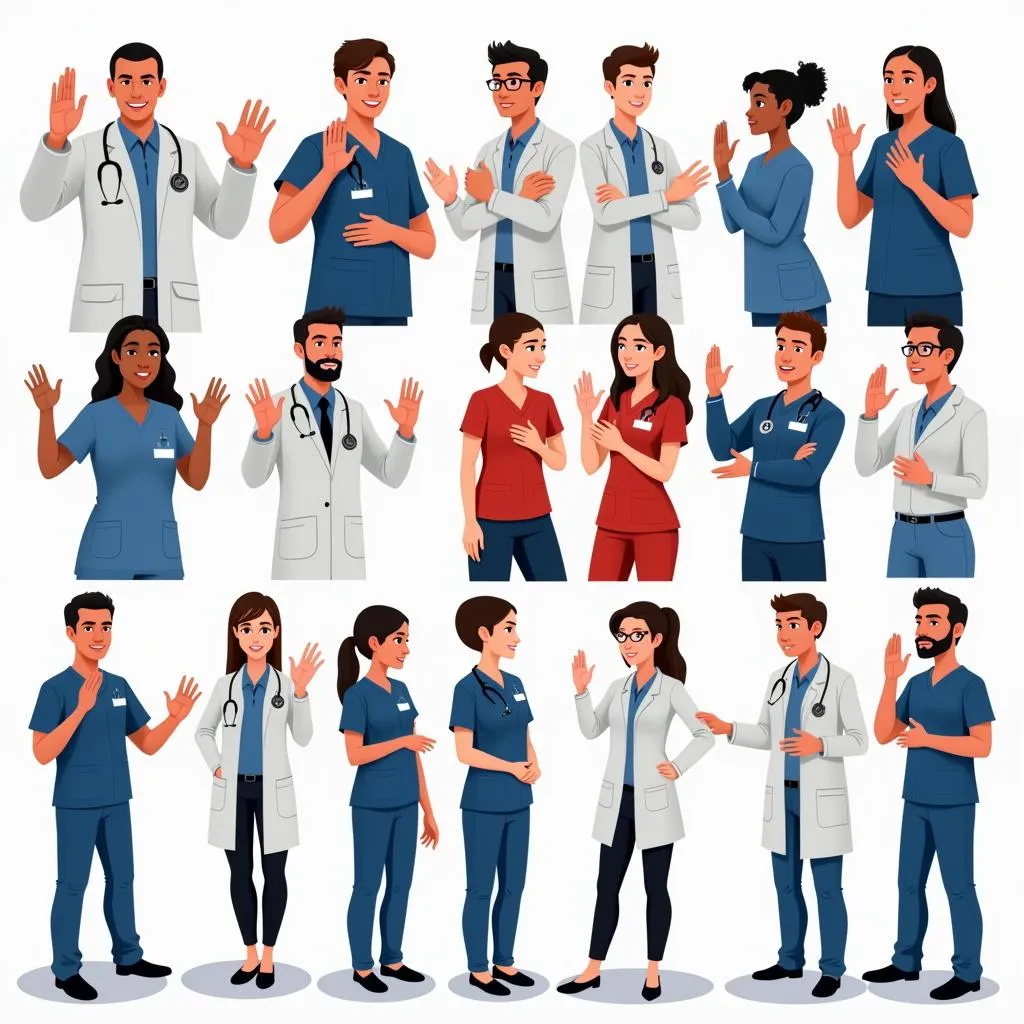Navigating the healthcare system can be challenging, especially for individuals who are deaf or hard of hearing. Thankfully, Asl Hospitals are bridging the communication gap by providing comprehensive medical services in American Sign Language. Choosing the right ASL hospital is crucial for receiving effective and equitable healthcare.
 An ASL Interpreter Communicating with a Deaf Patient
An ASL Interpreter Communicating with a Deaf Patient
What to Look for in an ASL Hospital
While many hospitals offer some level of deaf and hard of hearing services, true ASL hospitals go above and beyond to ensure accessibility is woven into every aspect of patient care.
Here’s what sets them apart:
- ASL Proficiency Throughout: From doctors and nurses to receptionists and administrative staff, an ASL hospital will have a high level of ASL proficiency across its workforce. This ensures clear communication at every touchpoint of the patient journey.
- Interpreter Services On-Demand: While staff fluency in ASL is ideal, an ASL hospital should also have qualified interpreters readily available for situations requiring additional support or specialized vocabulary.
- Visual Communication Aids: Beyond language, ASL hospitals prioritize visual communication. Think clear signage, captioned telephones, and technology that facilitates real-time text communication.
- Culturally Sensitive Care: Understanding Deaf culture fosters trust and improves patient outcomes. ASL hospitals often incorporate cultural sensitivity training for their staff and provide resources that cater to the specific needs of the Deaf community.
 Deaf Patient Smiles During Consultation with Doctor
Deaf Patient Smiles During Consultation with Doctor
Benefits of Choosing an ASL Hospital
Opting for an ASL hospital offers significant advantages for deaf and hard of hearing individuals:
- Reduced Communication Barriers: Direct communication in ASL eliminates the need for relying solely on lip-reading or written notes, which can be prone to misinterpretations.
- Increased Patient Engagement: When patients can fully understand their diagnosis, treatment options, and care plans, they are empowered to actively participate in their health journey.
- Improved Health Outcomes: Studies have shown that effective communication between patients and healthcare providers leads to better adherence to treatment plans and improved health outcomes.
- Greater Patient Satisfaction: Feeling heard and understood significantly impacts patient satisfaction. ASL hospitals prioritize creating a welcoming and inclusive environment where deaf and hard of hearing individuals feel respected and valued.
Making Informed Decisions About Your Healthcare
Finding the right ASL hospital might require some research, but the effort is worthwhile. Consider these steps:
- Ask for Recommendations: Reach out to local deaf community organizations, support groups, or ASL interpreters for recommendations.
- Online Research: Utilize online resources and directories specifically designed to locate ASL-friendly healthcare providers.
- Contact Hospitals Directly: Don’t hesitate to contact hospitals directly and inquire about their ASL services, interpreter availability, and commitment to deaf-friendly practices.
 Diverse Group of Medical Professionals Signing
Diverse Group of Medical Professionals Signing
Your Health, Your Language, Your Choice
Choosing an ASL hospital is about more than just medical care; it’s about accessing healthcare in a language and environment that empowers you to take control of your well-being. By prioritizing accessibility and cultural sensitivity, ASL hospitals ensure that deaf and hard of hearing individuals receive the same high-quality healthcare as everyone else.
Remember, your health is your right, and receiving care in your language is an essential part of that right.
FAQs about ASL Hospitals
1. Are ASL hospitals only for people who are completely deaf?
No, ASL hospitals are for anyone who communicates primarily in American Sign Language, including those who are deaf, hard of hearing, or have some degree of hearing loss.
2. What if I need to see a specialist who is not fluent in ASL?
ASL hospitals will have procedures in place to ensure that qualified interpreters are available to facilitate communication with any specialist or healthcare provider.
3. Do ASL hospitals offer translation services for written medical documents?
Yes, most ASL hospitals provide translation services to ensure that patients have access to their medical records and other important documents in a format they can understand.
4. Are ASL hospitals more expensive than other hospitals?
The cost of care at an ASL hospital should be comparable to other hospitals in the same area. Most insurance plans cover the cost of interpreter services, but it’s always best to check with your provider to confirm coverage.
5. Can I request an ASL interpreter even if I’m not at an ASL hospital?
Yes, you have the right to request an ASL interpreter at any healthcare facility. Hospitals are legally obligated to provide interpreter services, though the availability and response time may vary.
For immediate assistance or to learn more about our services, please contact our 24/7 helpline at 02437655121, email us at [email protected], or visit us at 298 Cau Dien St., Minh Khai Ward, Bac Tu Liem District, Hanoi, Vietnam. We are dedicated to providing accessible healthcare for all.